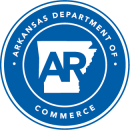About Arkansas Workforce Connections
Arkansas Workforce Connections is a division of the Arkansas Department of Commerce and sits at the center of the state’s workforce development efforts. We provide support and guidance to help individuals succeed in their careers while offering companies incentives to maintain a skilled and technically trained workforce, meeting industry demands now and in the future.
Offices
Arkansas Workforce Connections consists of five major offices. Each office administers multiple state and federal grants, oversees programs, and provides employment-related services to Arkansas employers and job seekers.
Recent Reorganization
The Arkansas Department of Commerce recently reorganized the Arkansas Division of Workforce Services into three new divisions: Arkansas Workforce Connections, Reemployment (formerly Unemployment Insurance), and Workforce Policy and Innovation.
Reemployment
While Workforce Connections focuses primarily on employment and training programs, Reemployment administers the unemployment insurance program in Arkansas. Although Reemployment is now its own division, we will continue to house its information on this website for the time being to ensure claimants have continued access to unemployment insurance resources, forms, and links.
Workforce Policy and Innovation
The new Workforce Policy and Innovation division is home to the Arkansas labor market information team, which manages Bureau of Labor Statistics programs and publishes data to Discover Arkansas (www.discover.arkansas.gov). While the programs have been reorganized into new divisions, access to programs and services has not changed.
Local Connections
The major agency sections have staff in local offices across the state, often within the Arkansas Workforce Centers. To view locations, click on one of the links below.
Click here to find an Arkansas Workforce Center
Click here to find an Adult Education Center
Administration
Cody Waits, Director, Arkansas Workforce Connections
501-682-3125 | cody.waits@arkansas.gov
Eddie L. Thomas, MPA, MAT, Deputy Director, Office of Employment & Training
501-371-1028 | eddie.thomas@arkansas.gov
Trenia Miles, Ed.D., Director, Office of Adult Education
501-683-7334 | trenia.miles@arkansas.gov
Joseph Baxter, Commissioner, Office of Rehabilitation Services
501-296-1614 | joseph.baxter@arkansas.gov
Cassondra Williams-Stokes, D.M., Director, Division of Services for the Blind
501-682-0361 | cassondra.williams@arkansas.gov
Charisse Childers, Ph.D., Director, Workforce Policy and Innovation
501-682-2121 | charisse.childers@arkansas.gov
Kristen Rhodes-Berry, Director, Reemployment
501-683-5366 | kristen.rhodes@arkansas.gov
Vision & Mission
Vision: To accelerate economic growth and individual prosperity in the state of Arkansas.
Mission: To support and secure Arkansas’ economic vitality through a highly skilled workforce by administering programs and providing efficient services that empower employers and job seekers.
About the Arkansas Department of Commerce
The Arkansas Department of Commerce is the umbrella department for workforce and economic development drivers. Its divisions and regulatory boards include the Division of Aeronautics, Waterways Commission, Wine Producers Council, Workforce Connections, Reemployment, Workforce Policy and Innovation, Office of Skills Development, State Bank Department, Insurance Department, Securities Department, Economic Development Commission, and Development Finance Authority. Read more.
Follow us on social media!
Click the icon below to go to our Facebook page.



